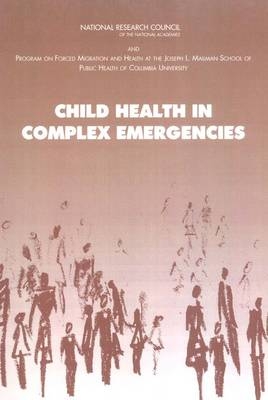
Child Health in Complex Emergencies
Seiten
2006
National Academies Press (Verlag)
978-0-309-10063-2 (ISBN)
National Academies Press (Verlag)
978-0-309-10063-2 (ISBN)
Child Health in Complex Emergencies (2006)
Addressing the health needs of children in complex emergencies is critical to the success of relief efforts and requires coordinated and effective interventions. However, little systematic work has been undertaken to evaluate such care. To address this need, this monograph presents a review of the published literature in this area, providing background on the burden of disease, the major causes of morbidity and mortality, and the evidence base for effective interventions. It also describes surveys of nongovernmental organizations (NGOs) and international agencies providing care to children in complex emergencies, which were conducted to identify guidelines commonly used to provide such care and assesses the content and limitations of these guidelines. A more in-depth survey of several organizations was also conducted to assess obstacles to this kind of care.
On the basis of the survey findings and the review of the published literature, the working group recommended that evidence-based, locally adapted guidelines to address the curative and preventive care of children in complex emergencies and health systems planning should be adopted by ministries of health and supported by the World Health Organization (WHO) and UNICEF. The guidelines should target, as much as possible, the different levels of health care workers providing care to children to ensure appropriate, effective, and uniform care in a variety of situations.
Child Health in Complex Emergencies presents specific examples of areas for further research and guideline development. This report is not intended to be an exhaustive and definitive assessment of child health in complex emergencies. The topic is much too vast and complex, and different individuals and institutions will have incompatible perspectives. Rather, we aim to provide a starting point for discussion and debate on how to improve the care of children in these settings.
Table of Contents
Front Matter
Child Health in Complex Emergencies
References
Appendix A Survey Respondents and Instruments
Appendix B Summary of Comprehensive Guidelines
Appendix C About the Authors
Addressing the health needs of children in complex emergencies is critical to the success of relief efforts and requires coordinated and effective interventions. However, little systematic work has been undertaken to evaluate such care. To address this need, this monograph presents a review of the published literature in this area, providing background on the burden of disease, the major causes of morbidity and mortality, and the evidence base for effective interventions. It also describes surveys of nongovernmental organizations (NGOs) and international agencies providing care to children in complex emergencies, which were conducted to identify guidelines commonly used to provide such care and assesses the content and limitations of these guidelines. A more in-depth survey of several organizations was also conducted to assess obstacles to this kind of care.
On the basis of the survey findings and the review of the published literature, the working group recommended that evidence-based, locally adapted guidelines to address the curative and preventive care of children in complex emergencies and health systems planning should be adopted by ministries of health and supported by the World Health Organization (WHO) and UNICEF. The guidelines should target, as much as possible, the different levels of health care workers providing care to children to ensure appropriate, effective, and uniform care in a variety of situations.
Child Health in Complex Emergencies presents specific examples of areas for further research and guideline development. This report is not intended to be an exhaustive and definitive assessment of child health in complex emergencies. The topic is much too vast and complex, and different individuals and institutions will have incompatible perspectives. Rather, we aim to provide a starting point for discussion and debate on how to improve the care of children in these settings.
Table of Contents
Front Matter
Child Health in Complex Emergencies
References
Appendix A Survey Respondents and Instruments
Appendix B Summary of Comprehensive Guidelines
Appendix C About the Authors
William J. Moss, Meenakshi Ramakrishnan, Dory Storms, Anne Henderson Siegle, William M. Weiss, and Lulu Muhe, Roundtable on the Demography of Forced Migrations, Program on Forced Migration and Health, Mailman School of Public Health Columbia University, National Research Council
1 Front Matter; 2 Child Health in Complex Emergencies; 3 References; 4 Appendix A Survey Respondents and Instruments; 5 Appendix B Summary of Comprehensive Guidelines; 6 Appendix C About the Authors
| Erscheint lt. Verlag | 8.1.2006 |
|---|---|
| Verlagsort | Washington |
| Sprache | englisch |
| Maße | 152 x 229 mm |
| Themenwelt | Medizin / Pharmazie ► Medizinische Fachgebiete ► Notfallmedizin |
| Medizin / Pharmazie ► Medizinische Fachgebiete ► Pädiatrie | |
| ISBN-10 | 0-309-10063-1 / 0309100631 |
| ISBN-13 | 978-0-309-10063-2 / 9780309100632 |
| Zustand | Neuware |
| Haben Sie eine Frage zum Produkt? |
Mehr entdecken
aus dem Bereich
aus dem Bereich
1000 kommentierte Prüfungsfragen
Buch (2023)
Thieme (Verlag)
100,00 €


